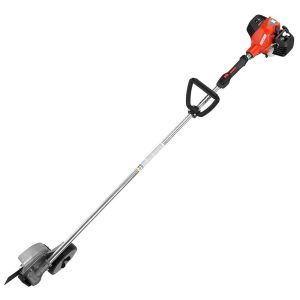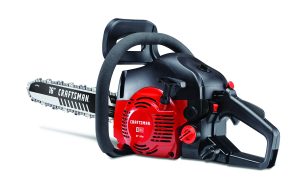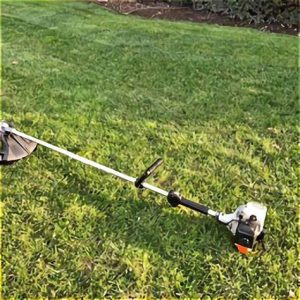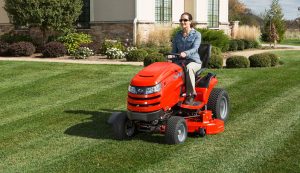Your Ryobi String Trimmer Stalls and Dies: SOLVED!
A string trimmer is a great tool to trim those areas that you are unable to reach with a lawn mower. Ryobi makes a good string trimmer, often called a weed eater or weed wacker, but just like any power tool, it can develop problems including stalling and dying.
A Ryobi string trimmer will stall and then die when it isn’t getting fuel to the engine due to running old or dirty fuel that clogs the fuel filter, fuel line, fuel vent, or carburetor. It will also quit when the air filter is plugged, the spark arrestor is clogged or the choke setting is incorrect.
Before repairing your string trimmer, disconnect the spark plug and wait for all moving parts to stop. Always have safety shields installed before operating your string trimmer.

This post may include affiliate links. Purchases made through these links may provide a commission for us, at no extra cost to you. As an Amazon Associate, we earn from qualifying purchases.
Follow all safety instructions provided in your equipment operator’s manual prior to diagnosing, repairing, or operating.Consult a professional if you don’t have the skills, or knowledge or are not in the condition to perform the repair safely.
Table of Contents
8 Reasons Your Ryobi String Trimmer Starts Then Dies
Incorrect Choke Setting Causes a Ryobi String Trimmer to Start Then Die
Your Ryobi string trimmer has a choke lever to restrict the airflow to allow more fuel and less air to start a cold engine. The choke lever should be in the full choke to start a cold engine and then adjusted to the off position as the engine warms up.
Turning the choke off or in the “run” position allows a normal rate of air to be mixed with fuel to keep your Ryobi string trimmer running. When the choke isn’t adjusted after the engine warms up, it will begin to sputter and die because it isn’t getting the air it needs to continue to run.
Plugged Air Filter Causes a Ryobi String Trimmer to Start Then Die
Just like your Ryobi engine can die from a lack of air when the choke is left on, it can stall and die when there is a lack of air from a plugged air filter. Your Ryobi string trimmer requires an air filter to prevent dirt and debris from getting sucked into the engine.
When the air filter isn’t regularly checked, cleaned, and replaced, it can become so plugged, the engine will be starved of air. It’s good practice to replace the air filter annually when completing your annual tune-up. Then, check and clean it several times throughout the lawn care season.
Never run your string trimmer without an air filter, even if it’s just for a short period so you can finish your task. Doing so can compromise the engine.
How to Clean a Foam Ryobi Air Filter:
- Remove the air filter housing cover.
- Remove the air filter being careful not to allow dirt to fall into the air intake.
- Wipe out any dirt that remains in the housing.
- Reuse the filter if it is in good condition and not brittle, forming dark spots, or has tears in the filter. Purchase a new foam air filter if you find any of these conditions.
- Wash a filter that is able to be reused. Use a mild dish soap and water to remove dirt. Rinse until clear.
- Lay flat to dry.
- Once completely dry, coat with a foam filter oil and replace in the filter housing.
- Reattach the cover.
Old or Bad Fuel Causes a Ryobi String Trimmer to Start Then Die
Running old fuel through your Ryobi string trimmer can cause it to stall and run sluggishly. Most gasoline contains ethanol, a corn-based fuel that is added to make fuel more environmentally friendly. Ethanol is not good for the small engine used on your Ryobi.
Avoid running gasoline with high amounts of ethanol. Use unleaded gasoline with a minimum octane rating of 89 and a maximum ethanol content of 10% in your Ryobi string trimmer. A fuel without ethanol is always best, but it is more expensive.
2-cycle and 4-cycle Ryobi string trimmers have different fuel requirements. While they both use the same type of gas, a 2-cycle engine requires a 2-cycle oil to be mixed with the gas before adding to the fuel tank.
A 4-cycle engine requires only gas. Know which type of engine is on your Ryobi so you don’t damage the engine beyond repair.
Gas can begin breaking down as soon as 30 days after purchase. The ethanol attracts moisture to the fuel system increasing the possibility of your Ryobi string trimmer stalling and dying from a fuel restriction.
Old gas leaves behind varnish and gummy deposits that can clog the fuel lines and cause carburetor failure.
Only use fresh gasoline in your string trimmer. Use a fuel additive like Sea Foam Motor Treatment to reduce moisture and stabilize the gas so it lasts a little longer. Read more information in “This is the Type of Gas and Oil Ryobi String Trimmers Use“.
Plugged Fuel Filter Causes a Ryobi String Trimmer to Start Then Die
The fuel filter helps keep the fuel system clean and free of dirt and debris that may get into the fuel tank. You will find the fuel filter on your Ryobi string trimmer attached to the fuel line inside the fuel tank.
A fuel filter should be replaced annually and possibly more often if you happen to be running dirty fuel. When it isn’t changed, the filter can become so plugged that a sufficient amount of fuel isn’t able to pass through the filter causing your Ryobi trimmer to run sluggishly or quit running.
Replace a Ryobi fuel filter:
- Wipe around the fuel cap to remove dirt and debris so they don’t fall into the tank.
- Remove the cap.
- Pull the fuel filter out of the fuel tank. A clean bent wire works well to retrieve the filter.
- Once the filter is out of the tank, remove it from the fuel line. Be careful not to lose the retaining ring. Keep the ring on the fuel line.
- Attach the new fuel filter by inserting the male end into the fuel line and securing the line to the filter using the retaining ring.
- Place the fuel filter back inside the fuel tank.
- Install the fuel cap.
Clogged Fuel Lines Cause a Ryobi String Trimmer to Start Then Die
As I mentioned earlier, old fuel can leave behind gummy deposits that can restrict fuel flow through the fuel lines. When this happens, remove the fuel line and install a new fuel line of the same diameter and width. You will need to replace the fuel line if you find it is dry, cracked, or kinked.
Plugged Fuel Tank Cap Causes a Ryobi String Trimmer to Start Then Die
The Ryobi fuel tank requires a vent to allow air to pass through it. When this vent gets plugged, the fuel tank forms a vacuum. It doesn’t allow fuel to flow out of the tank which causes the trimmer to stall and die.
If you are not getting fuel to the carburetor, you are running a good filter and you don’t have any clogs in the fuel lines, you may have a clogged fuel vent. You can test this by placing your Ryobi string trimmer on a level surface.
Loosen the fuel cap to allow air into the tank and start the trimmer. Don’t allow gas to spill out of the fuel tank. When the trimmer starts and runs, replace the fuel cap with the trimmer still running.
Continue to let it run for a while. If it sputters and dies with the cap on and then starts and runs once the cap is removed, you most likely have a problem with the fuel tank vent.
Replace the vent with a new fuel tank vent. Most fuel tanks on a Ryobi string trimmer vent through the check valve in the fuel cap.
If this is the case for your Ryobi, replace the fuel cap. If your trimmer has a separate vent off the fuel line coming out of the fuel tank, you must replace the vent.
Dirty Carburetor Causes a Ryobi String Trimmer to Start Then Die
The carburetor mixes the correct proportion of air and fuel required for your Ryobi string trimmer to run. The passageways can become clogged and the small components can fail to function correctly.
This can cause an insufficient amount of fuel mixed with air resulting in a rough running string trimmer that may just quit. You may be able to clean your carburetor to get it working again. You may end up having to rebuild it (if rebuild kits are available for your carburetor) or replace the carburetor if cleaning doesn’t help.
Before replacing a carburetor, I recommend comparing the cost of the carburetor and labor expense to the cost of a new Ryobi string trimmer. Depending on the model, cost, and age of your string trimmer, you may be better off purchasing a new one.
Plugged Spark Arrestor Causes a Ryobi String Trimmer to Start Then Die
There is a small metal screen that keeps hot exhaust material from shooting out of the string trimmer and causing injury or starting a fire. This small screen will become plugged with a carbon buildup that will affect how the engine runs.
Disconnect the spark plug wire. On most Ryobi models, you will remove the engine cover and the engine exhaust cover to access the spark arrestor screen. Carefully remove the spark arrestor screen and inspect it for damage.
If it is in overall good condition, clean it with a wire brush and reinstall it. However, if it is damaged or has a hole in it, you must replace it with a new spark arrestor screen.
Contact your local Ryobi service center if you are having trouble locating the spark arrestor screen or if you are continuing to experience problems with your Ryobi string trimmer.







